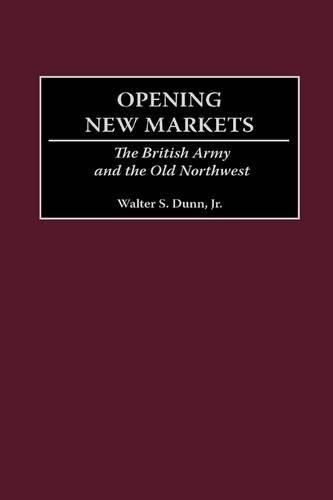
Opening New Markets: The British Army and the Old Northwest
(Hardback)
Publishing Details
Opening New Markets: The British Army and the Old Northwest
By (Author) Walter S. Dunn
Bloomsbury Publishing PLC
Praeger Publishers Inc
30th May 2002
United States
Classifications
Tertiary Education
Non Fiction
970.03
Physical Properties
Hardback
216
Description
Explores the inadequate efforts of the British army in protecting frontier trading posts and the impact of competing French and Canadian-based traders on the colonial economy. After the conclusion of Pontiac's Uprising, frontier trade reopened in 1765. Unfortunately, for the colonists, the renewed activity favored the French in Canada and Illinois and the British traders in Quebec and Montreal. Only three British regiments were assigned to frontier duty, an inadequate number of troops to enforce trade regulations against the French. To keep the peace with local tribes, the British army allowed the French to trade anywhere, while colonial merchants were restricted to army trading posts. Had the army been more astute in protecting colonial interests, colonial merchants might have been more favorable toward paying taxes in support of military efforts. Frontier commerce was a major component of the colonial economy, ranking third in export behind tobacco and rice. The European demand for fashionable broad-brimmed beaver hats was the driving force that created turmoil on the frontier from 1765 to 1768. After the cession of Canada to Britain in 1763, the French obtained half the beaver pelt exports by forcibly diverting them from Quebec to New Orleans and then on to France. This competition hurt wealthy colonial merchants in New York City and Philadelphia, who blamed the British army and set the tone for the coming conflict.
Reviews
[A]dds insight and perspective to our understanding of this chapter in the decade before the Revolution.-The Journal of Military History
Opening New Markets is engagingly written and includes numerous anecdotes that illuminate the times and the personalities central to the narrative.-The Journal of American History
This book, based almost entirely on primary documents gathered during Dunn's 35-year teaching career, argues that the loss of a positive cash flow was a primary cause of the Revolution. The final chapter is an excellent summary of these contentions. Upper-division undergraduates and above.-Choice
"Adds insight and perspective to our understanding of this chapter in the decade before the Revolution."-The Journal of Military History
"[A]dds insight and perspective to our understanding of this chapter in the decade before the Revolution."-The Journal of Military History
"Opening New Markets is engagingly written and includes numerous anecdotes that illuminate the times and the personalities central to the narrative."-The Journal of American History
"This book, based almost entirely on primary documents gathered during Dunn's 35-year teaching career, argues that the loss of a positive cash flow was a primary cause of the Revolution. The final chapter is an excellent summary of these contentions. Upper-division undergraduates and above."-Choice
Author Bio
WALTER S. DUNN, JR. has published numerous works in the areas of 18th century fur trade, museum administration, local history, and military history. His books include Second Front Now, 1943 (1981); Hitler's Nemesis: The Red Army, 1930-1945 (1994); Kursk: Hitler's Gamble, 1943 (1997); Frontier Profit and Loss: The British Army on the American Frontier, 1760-1764 (1998); and The New Imperial Economy: The British Army and the American Frontier, 1764-1768 (2001).
